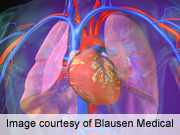
THURSDAY, Feb. 28 (HealthDay News) — Even though strokes typically involve a stoppage of blood flow to the brain, people with specific types of blockages in heart arteries may be especially prone to the attacks, a new study finds.
People with arterial clogs caused by what’s known as coronary artery calcification — calcium deposits in the artery — are at higher risk for stroke, even if they’re otherwise considered to have a low risk, the German researchers found.
The findings are published Feb. 28 in the journal Stroke.
“Stroke risk is tightly aligned with coronary atherosclerosis [hardening of the arteries], showing the closely related nature of cardiovascular and cerebrovascular [brain blood flow] disease,” lead investigator Dr. Dirk Hermann, a professor of vascular neurology and dementia at the University Hospital Essen, said in a journal news release.
In the study, researchers used a special type of CT scan to assess how much plaque was present in the heart (coronary) arteries of nearly 4,200 women and men, aged 45 to 75, who had never suffered a heart attack or stroke.
The participants were then followed for about eight years. During that time, there were 92 strokes. Heart artery blockages involving calcification were significantly higher in those who suffered a stroke than in those who did not have a stroke, the team found.
People with especially high calcification density levels were three times more likely to have a stroke than those with lower levels, according to the study published in the journal Stroke.
Stroke risk predictions based on how badly calcified arteries were seemed most accurate for people under 65 and those at low-risk of cardiovascular disease, the team said.
Patients who suffered a stroke were typically about 65 years old, were more likely to be overweight or obese, and were more likely to have diabetes, high blood pressure and high cholesterol levels, the team said.
More information
The U.S. National Institute of Neurological Disorders and Stroke has more about stroke and stroke prevention.

